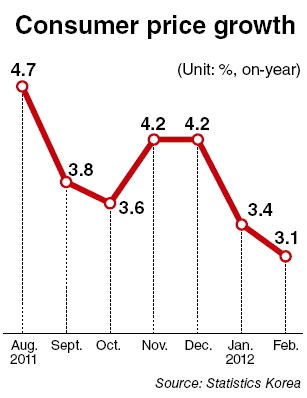The growth of consumer prices dropped to its lowest in 14 months in February, while worries over inflationary pressure continue mainly due to skyrocketing oil prices.
Statistics Korea data showed Friday that the nation’s consumer prices climbed 3.1 percent in February from a year earlier, which marked the lowest year-on-year growth since 3 percent in December 2010.

In January, year-on-year price growth came to 3.4 percent. An official at the statistics agency attributed the fall to a drop in public service charges and meat prices.
Meat prices and public service charges for February fell 12 percent and 0.6 percent, respectively, from a year before.
“The two sectors partly offset prices gains in petroleum products, industrial goods, private services and rent-related costs,” he said.
Data showed that fresh food prices, which include vegetables and fruit, edged up 0.4 percent.
Policymakers have been striving to tame inflation, which was driven mostly by rising crude oil, raw materials and food prices.
In 2011, the nation saw consumer prices grow 4 percent from a year earlier, reaching the upper ceiling of the Bank of Korea’s 2-4 percent target band.
Inflation exerts a negative influence on the economy since high prices can cause consumers to be reluctant to spend.
Despite last month’s lower inflation, government officials reiterated the necessity of keeping close tabs on inflationary pressure in the future.
Last year, prices of non-meat farm products and refined petroleum goods surged by 6.3 percent and 7.9 percent, respectively, from a year earlier.
Rent prices also went up 5 percent, while basic utility costs such as electricity and gas gained 5.8 percent.
Some government officials forecast that inflationary pressure will ease this year, predicting that consumer prices will rise 3.2 percent in 2012.
Meanwhile, the Korea Development Institute said that the economy sees growing inflationary pressure with both supply and demand factors contributing to increased consumer prices.
In its monthly report, the KDI said agricultural and livestock goods are still retailed at a high rate while the price of industrial commodities is driven up by high oil prices.
Pointing to the unrest in the oil-rich Middle East countries and others in North Africa, the state-run think tank expressed concerns that rises in oil prices would continue.
By Kim Yon-se (kys@heraldcorp.com)
Statistics Korea data showed Friday that the nation’s consumer prices climbed 3.1 percent in February from a year earlier, which marked the lowest year-on-year growth since 3 percent in December 2010.

In January, year-on-year price growth came to 3.4 percent. An official at the statistics agency attributed the fall to a drop in public service charges and meat prices.
Meat prices and public service charges for February fell 12 percent and 0.6 percent, respectively, from a year before.
“The two sectors partly offset prices gains in petroleum products, industrial goods, private services and rent-related costs,” he said.
Data showed that fresh food prices, which include vegetables and fruit, edged up 0.4 percent.
Policymakers have been striving to tame inflation, which was driven mostly by rising crude oil, raw materials and food prices.
In 2011, the nation saw consumer prices grow 4 percent from a year earlier, reaching the upper ceiling of the Bank of Korea’s 2-4 percent target band.
Inflation exerts a negative influence on the economy since high prices can cause consumers to be reluctant to spend.
Despite last month’s lower inflation, government officials reiterated the necessity of keeping close tabs on inflationary pressure in the future.
Last year, prices of non-meat farm products and refined petroleum goods surged by 6.3 percent and 7.9 percent, respectively, from a year earlier.
Rent prices also went up 5 percent, while basic utility costs such as electricity and gas gained 5.8 percent.
Some government officials forecast that inflationary pressure will ease this year, predicting that consumer prices will rise 3.2 percent in 2012.
Meanwhile, the Korea Development Institute said that the economy sees growing inflationary pressure with both supply and demand factors contributing to increased consumer prices.
In its monthly report, the KDI said agricultural and livestock goods are still retailed at a high rate while the price of industrial commodities is driven up by high oil prices.
Pointing to the unrest in the oil-rich Middle East countries and others in North Africa, the state-run think tank expressed concerns that rises in oil prices would continue.
By Kim Yon-se (kys@heraldcorp.com)




![[Music in drama] Rekindle a love that slipped through your fingers](http://res.heraldm.com/phpwas/restmb_idxmake.php?idx=644&simg=/content/image/2024/05/01/20240501050484_0.jpg&u=20240501151646)

![[New faces of Assembly] Architect behind ‘audacious initiative’ believes in denuclearized North Korea](http://res.heraldm.com/phpwas/restmb_idxmake.php?idx=644&simg=/content/image/2024/05/01/20240501050627_0.jpg&u=20240502093000)




![[KH Explains] Will alternative trading platform shake up Korean stock market?](http://res.heraldm.com/phpwas/restmb_idxmake.php?idx=644&simg=/content/image/2024/05/01/20240501050557_0.jpg&u=20240501161906)






![[Today’s K-pop] Stray Kids go gold in US with ‘Maniac’](http://res.heraldm.com/phpwas/restmb_idxmake.php?idx=642&simg=/content/image/2024/05/02/20240502050771_0.jpg&u=)